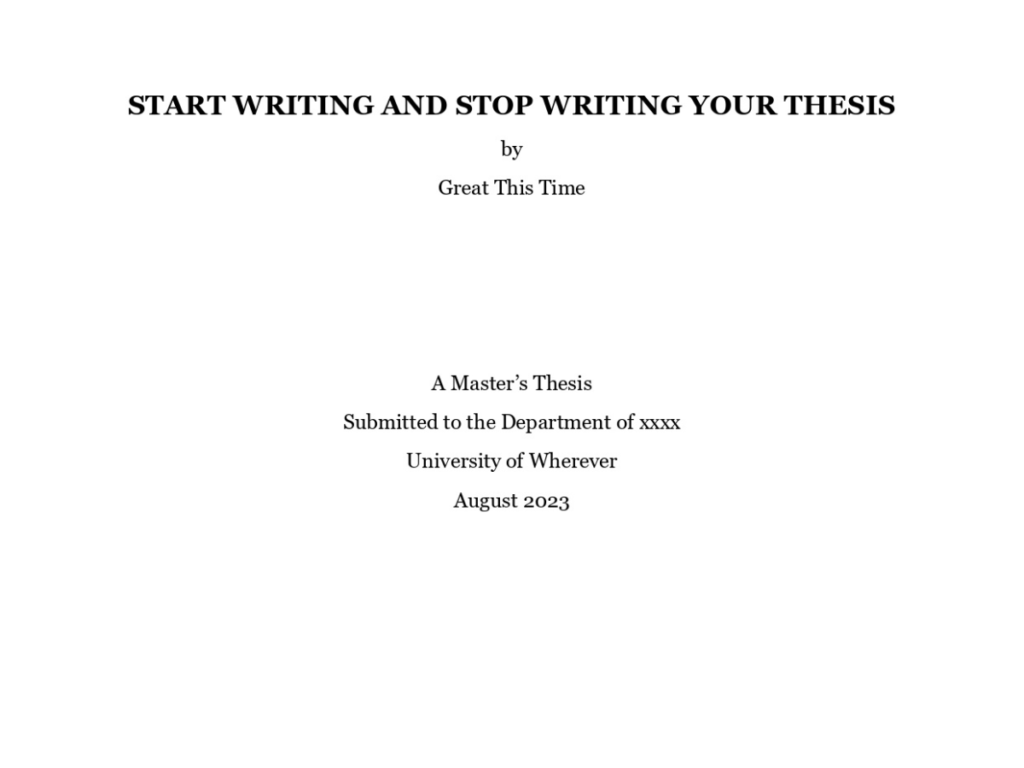There is a lot of pressure involved in thesis writing. Whatever kind of thesis you are writing, for your Bachelor’s, Master’s or even if you are writing your PhD dissertation, you will face a rollercoaster of emotions and possibly some frustration. There is a lot of responsibility around thesis writing and the direct relationship you have with your supervisor makes you feel somewhat even more accountable. It is easy to feel discouraged by the whole emotional load and feel a little lost.
When I started writing my first thesis, many moons ago, I didn’t really know how to manage things. My supervisor at the time was, basically, non-existent, and I would interact with his assistant who didn’t really know much either. I had to learn by myself and did the best I could. It turned out to be a nice work, nothing world-changing, but a nice step towards my future in academia.
When I got to my master’s thesis, I realized I had to step up things. I was presenting a much more in-depth and novel work, which turned out to be so relevant as to be published and used by international organizations. The pressure was high. While I was incredibly happy with the results that my 10-month research studies gave me (in the form of my thesis), I was staggered when starting to work on it.
By the time I got to my PhD dissertation I had acquired confidence in my capabilities, not only related to the topics under investigation but to thesis management as well. However, some innate tendencies were still there. I had to force myself into doing something that would not necessarily always come naturally.
While several things differ from country to country and from person to person, these two things are of fundamental value for most: start writing your thesis and stop writing – or better rewriting – your thesis. They seem trivial concepts and, yet, they can be hard to manage while doing, especially while starting, a thesis.
1. Start Writing your Thesis
Literature review is essential to thesis writing, and so is choosing and developing a methodology. It is a very good idea to start by gathering essential literature on both, the topic and the methodologies that you may want to use to develop your investigation. That can lead you to lose track of the essential part – writing the thesis – though.
While reviewing and developing an outline for your work is essential and you should keep doing it over the course of your work, it is important not to become stagnant and not to become the person that won’t start until everything is perfect and everything is “clear”. It won’t ever be. As soon as you have a good understanding of where you want to go with your thesis start writing something down. This will also help you understand if you have some areas that you still need to study or if you have a completely wrong understanding about something.
Start writing and challenge what you wrote: do you have answers for those challenges? Do you know how to handle the weak parts? Write that down, too. Do not waste months over months preparing to write the perfect thesis at the first try. You won’t. Furthermore, the more you wait, the more pressure you put on yourself. You may be lucky and have a supervisor who is very present and will push you towards the right direction, but you also may not. Be your own supervisor: give yourself a restricted amount of time to gather what you need to start off and then just do it. Do yourself a favor and do not expect your thesis to be extremely good from the get-go. You may be the best at it, and your thesis may be the best ever already from the first draft. However, not having that expectation will free you and will allow you to see clearly and work in a more productive way.
Writing can be challenging even during the completion of the thesis, not just at the beginning. Picture this: you started writing, you are developing a mathematical model, modifying it to make it perfect and you just stay there, keep doing that and struggle to get your mojo back to complete the paper, or chapter. An effective way to get over that is to do a writing retreat. That will give you the push you need and should work towards improving your productivity.
2. Stop Rewriting Your Thesis
Rewriting is normal and essential to good thesis writing. However, the need for perfection can get you again. You write something, read it over and over, and change things every time you read it. it’s normal, there is always a better way of expressing what you said. However, when you got to a point where your work is good enough, the essential part here is to ask yourself the question: “does this convey the concept I am trying to convey?”. If the answer is yes, then get over it. You can go on, focus on other parts of the thesis, and maybe do a final check at the end. That will be your chance to embellish what you wrote. However, do not let your need to “make it better” delay your work. If you are lucky and have a supervisor that actually reads your work while you are doing it, he will be able to let you know if there are confusing parts that may make your work hard to understand. If you do not have that, and even if you do, one thing you should try is explaining your work to somebody who knows nothing about it. That will be a great tool for when you will have to develop a presentation for your work, but it will also help you see if something may need further simple explaining in your written thesis. Remember: just because academics will read it, it doesn’t mean they will understand it, if it is not broken down enough. Academics, obviously, do not know everything about everything, and may need help understanding what you are developing, even more so if your work is particularly novel.
Instead of rewriting over and over the same things in your thesis, maybe changing writing style but not essentially addressing critical issues, try breaking down the concepts you want to convey, try to explain them to somebody who is not used to those concepts, and understand how you can integrate – instead than rewrite – your thesis. This will help you deliver a better work in a shorter period of time.
Thesis writing can lead you to overthink everything you do – or don’t do – regarding your thesis. While some of that overthinking is essential to good thesis writing, you need to manage yourself and your expectations so to push yourself to deliver good work in an acceptable time frame, all while avoiding putting too much pressure on yourself.






